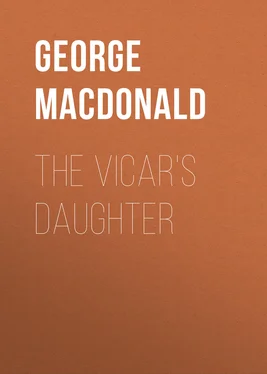George MacDonald - The Vicar's Daughter
Здесь есть возможность читать онлайн «George MacDonald - The Vicar's Daughter» — ознакомительный отрывок электронной книги совершенно бесплатно, а после прочтения отрывка купить полную версию. В некоторых случаях можно слушать аудио, скачать через торрент в формате fb2 и присутствует краткое содержание. Издательство: Иностранный паблик, Жанр: foreign_prose, foreign_religion, foreign_antique, на английском языке. Описание произведения, (предисловие) а так же отзывы посетителей доступны на портале библиотеки ЛибКат.
- Название:The Vicar's Daughter
- Автор:
- Издательство:Иностранный паблик
- Жанр:
- Год:неизвестен
- ISBN:нет данных
- Рейтинг книги:3 / 5. Голосов: 1
-
Избранное:Добавить в избранное
- Отзывы:
-
Ваша оценка:
- 60
- 1
- 2
- 3
- 4
- 5
The Vicar's Daughter: краткое содержание, описание и аннотация
Предлагаем к чтению аннотацию, описание, краткое содержание или предисловие (зависит от того, что написал сам автор книги «The Vicar's Daughter»). Если вы не нашли необходимую информацию о книге — напишите в комментариях, мы постараемся отыскать её.
The Vicar's Daughter — читать онлайн ознакомительный отрывок
Ниже представлен текст книги, разбитый по страницам. Система сохранения места последней прочитанной страницы, позволяет с удобством читать онлайн бесплатно книгу «The Vicar's Daughter», без необходимости каждый раз заново искать на чём Вы остановились. Поставьте закладку, и сможете в любой момент перейти на страницу, на которой закончили чтение.
Интервал:
Закладка:
CHAPTER IX.
THE FOUNDLING RE-FOUND
One evening, during this my first visit to my home, we had gone to take tea with the widow of an old servant, who lived in a cottage on the outskirts of the home farm,—Connie and I in the pony carriage, and my father and mother on foot. It was quite dark when we returned, for the moon was late. Connie and I got home first, though we had a good round to make, and the path across the fields was but a third of the distance; for my father and mother were lovers, and sure to be late when left out by themselves. When we arrived, there was no one to take the pony; and when I rung the bell, no one answered. I could not leave Connie in the carriage to go and look; so we waited and waited till we were getting very tired, and glad indeed we were to hear the voices of my father and mother as they came through the shrubbery. My mother went to the rear to make inquiry, and came back with the news that Theo was missing, and that they had been searching for her in vain for nearly an hour. My father instantly called Wagtail, and sent him after her. We then got Connie in, and laid her on the sofa, where I kept her company while the rest went in different directions, listening from what quarter would come the welcome voice of the dog. This was so long delayed, however, that my father began to get alarmed. At last he whistled very loud; and in a little while Wagtail came creeping to his feet, with his tail between his legs,—no wag left in it,—clearly ashamed of himself. My father was now thoroughly frightened, and began questioning the household as to the latest knowledge of the child. It then occurred to one of the servants to mention that a strange-looking woman had been seen about the place in the morning,—a tall, dark woman, with a gypsy look. She had come begging; but my father's orders were so strict concerning such cases, that nothing had been given her, and she had gone away in anger. As soon as he heard this, my father ordered his horse, and told two of the men to get ready to accompany him. In the mean time, he came to us in the little drawing-room, trying to look calm, but evidently in much perturbation. He said he had little doubt the woman had taken her.
"Could it be her mother?" said my mother.
"Who can tell?" returned my father. "It is the less likely that the deed seems to have been prompted by revenge."
"If she be a gypsy's child,"—said my mother.
"The gypsies," interrupted my father, "have always been more given to taking other people's children than forsaking their own. But one of them might have had reason for being ashamed of her child, and, dreading the severity of her family, might have abandoned it, with the intention of repossessing herself of it, and passing it off as the child of gentlefolks she had picked up. I don't know their habits and ways sufficiently; but, from what I have heard, that seems possible. However, it is not so easy as it might have been once to succeed in such an attempt. If we should fail in finding her to-night, the police all over the country can be apprised of the fact in a few hours, and the thief can hardly escape."
"But if she should be the mother?" suggested my mother.
"She will have to prove that."
"And then?"
"What then?" returned my father, and began pacing up and down the room, stopping now and then to listen for the horses' hoofs.
"Would you give her up?" persisted my mother.
Still my father made no reply. He was evidently much agitated,—more, I fancied, by my mother's question than by the present trouble. He left the room, and presently his whistle for Wagtail pierced the still air. A moment more, and we heard them all ride out of the paved yard. I had never known him leave my mother without an answer before.
We who were left behind were in evil plight. There was not a dry eye amongst the women, I am certain; while Harry was in floods of tears, and Charley was bowling. We could not send them to bed in such a state; so we kept them with us in the drawing-room, where they soon fell fast asleep, one in an easy-chair, the other on a sheepskin mat. Connie lay quite still, and my mother talked so sweetly and gently that she soon made me quiet too. But I was haunted with the idea somehow,—I think I must have been wandering a little, for I was not well,—that it was a child of my own that was lost out in the dark night, and that I could not anyhow reach her. I cannot explain the odd kind of feeling it was,—as if a dream had wandered out of the region of sleep, and half-possessed my waking brain. Every now and then my mother's voice would bring me back to my senses, and I would understand it all perfectly; but in a few moments I would be involved once more in a mazy search after my child. Perhaps, however, as it was by that time late, sleep had, if such a thing be possible, invaded a part of my brain, leaving another part able to receive the impressions of the external about me. I can recall some of the things my mother said,—one in particular.
"It is more absurd," she said, "to trust God by halves, than it is not to believe in him at all. Your papa taught me that before one of you was born."
When my mother said any thing in the way of teaching us, which was not often, she would generally add, "Your papa taught me that," as if she would take refuge from the assumption of teaching even her own girls. But we set a good deal of such assertion down to her modesty, and the evidently inextricable blending of the thought of my father with every movement of her mental life.
"I remember quite well," she went on, "how he made that truth dawn upon me one night as we sat together beside the old mill. Ah, you don't remember the old mill! it was pulled down while Wynnie was a mere baby."
"No, mamma; I remember it perfectly," I said.
"Do you really?—Well, we were sitting beside the mill one Sunday evening after service; for we always had a walk before going home from church. You would hardly think it now; but after preaching he was then always depressed, and the more eloquently he had spoken, the more he felt as if he had made an utter failure. At first I thought it came only from fatigue, and wanted him to go home and rest; but he would say he liked Nature to come before supper, for Nature restored him by telling him that it was not of the slightest consequence if he had failed, whereas his supper only made him feel that he would do better next time. Well, that night, you will easily believe he startled me when he said, after sitting for some time silent, 'Ethel, if that yellow-hammer were to drop down dead now, and God not care, God would not be God any longer.' Doubtless I showed myself something between puzzled and shocked, for he proceeded with some haste to explain to me how what he had said was true. 'Whatever belongs to God is essential to God,' he said. 'He is one pure, clean essence of being, to use our poor words to describe the indescribable. Nothing hangs about him that does not belong to him,—that he could part with and be nothing the worse. Still less is there any thing he could part with and be the worse. Whatever belongs to him is of his own kind, is part of himself, so to speak. Therefore there is nothing indifferent to his character to be found in him; and therefore when our Lord says not a sparrow falls to the ground without our Father, that, being a fact with regard to God, must be an essential fact,—one, namely, without which he could be no God.' I understood him, I thought; but many a time since, when a fresh light has broken in upon me, I have thought I understood him then only for the first time. I told him so once; and he said he thought that would be the way forever with all truth,—we should never get to the bottom of any truth, because it was a vital portion of the all of truth, which is God."
Читать дальшеИнтервал:
Закладка:
Похожие книги на «The Vicar's Daughter»
Представляем Вашему вниманию похожие книги на «The Vicar's Daughter» списком для выбора. Мы отобрали схожую по названию и смыслу литературу в надежде предоставить читателям больше вариантов отыскать новые, интересные, ещё непрочитанные произведения.
Обсуждение, отзывы о книге «The Vicar's Daughter» и просто собственные мнения читателей. Оставьте ваши комментарии, напишите, что Вы думаете о произведении, его смысле или главных героях. Укажите что конкретно понравилось, а что нет, и почему Вы так считаете.












